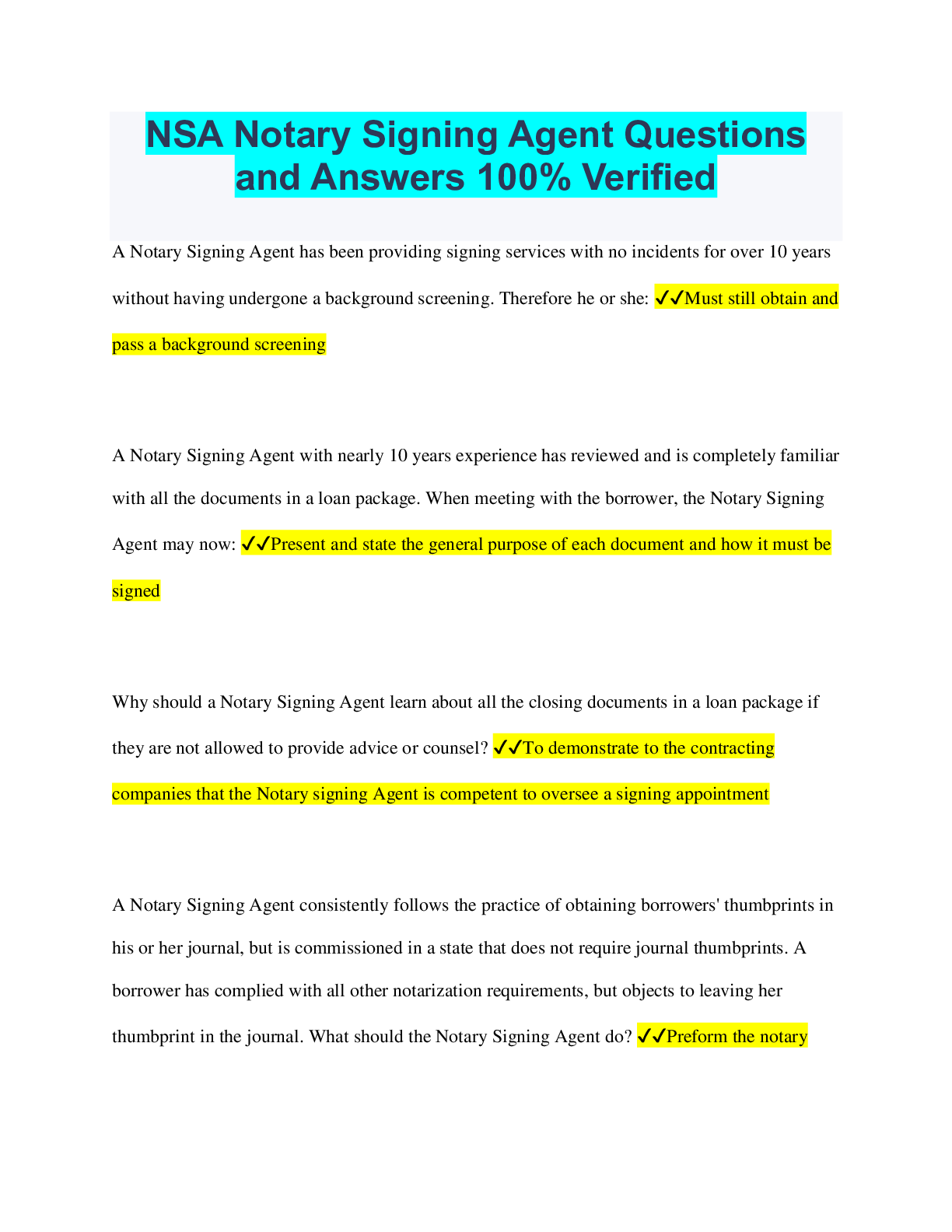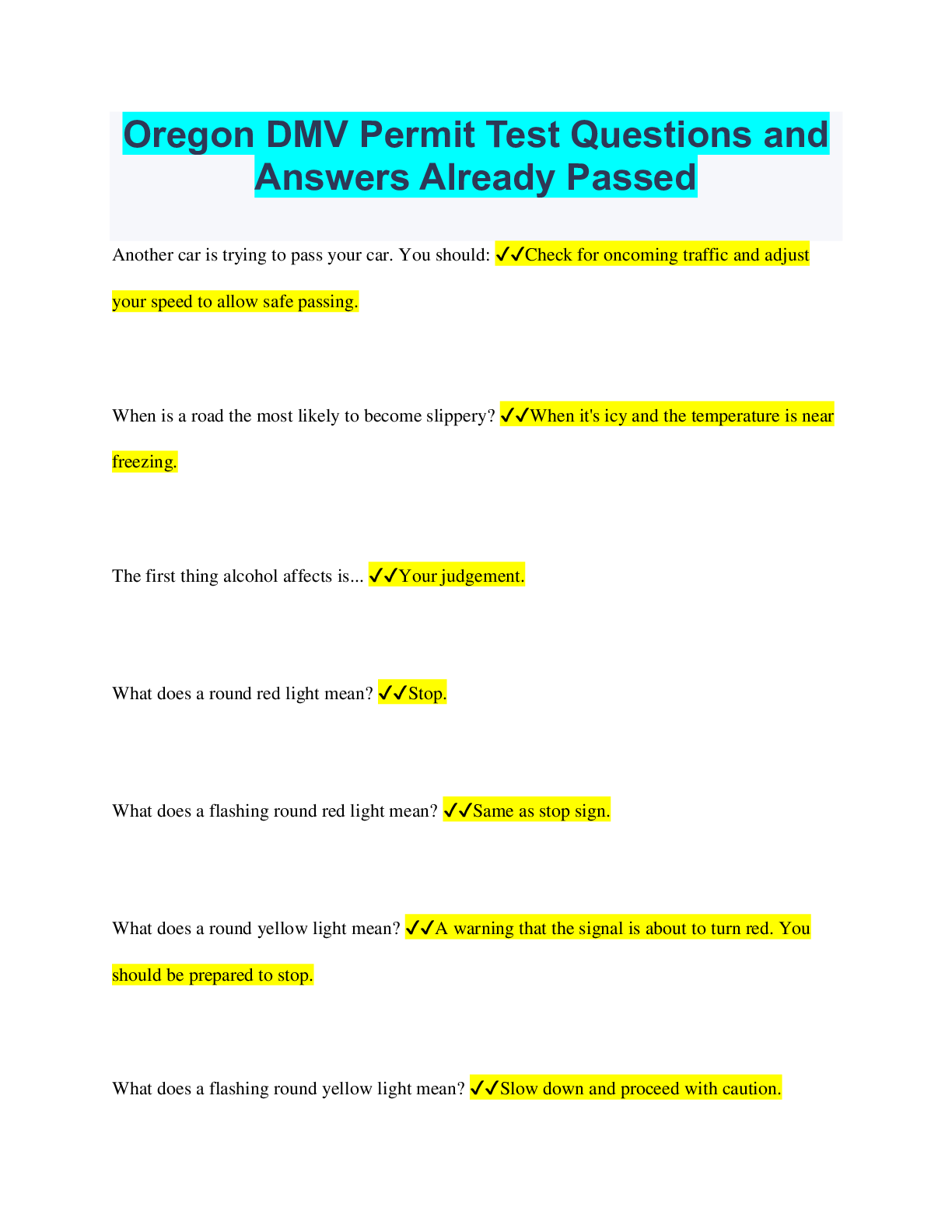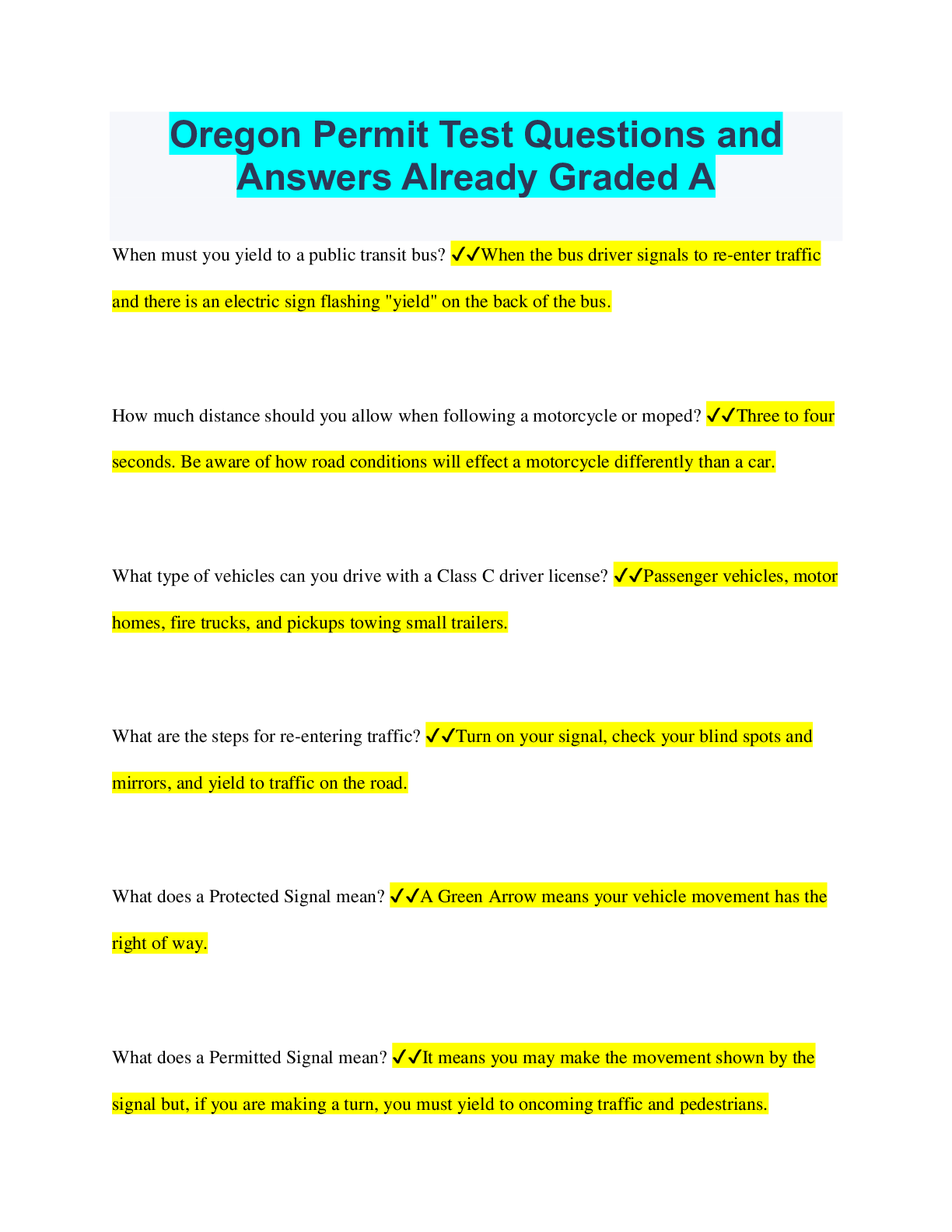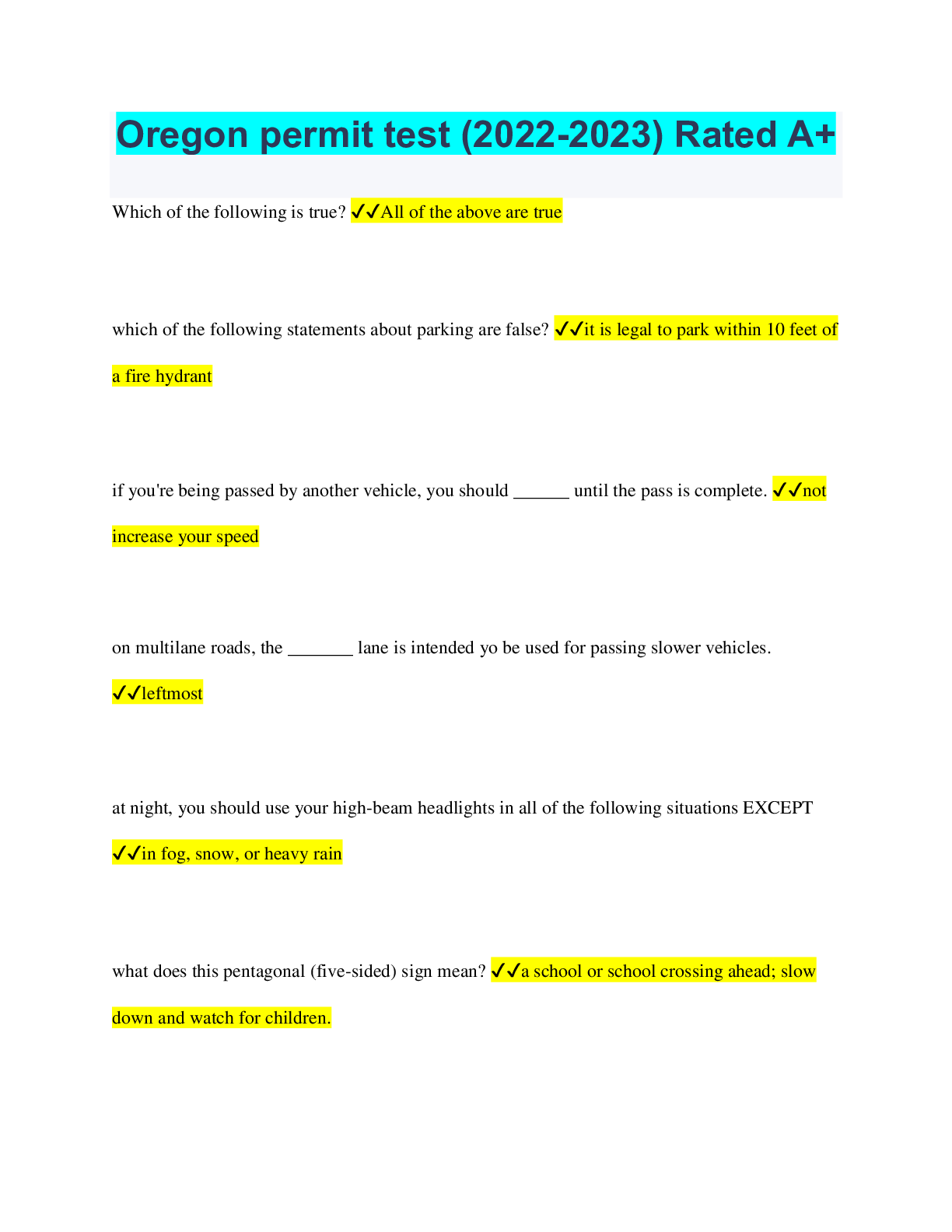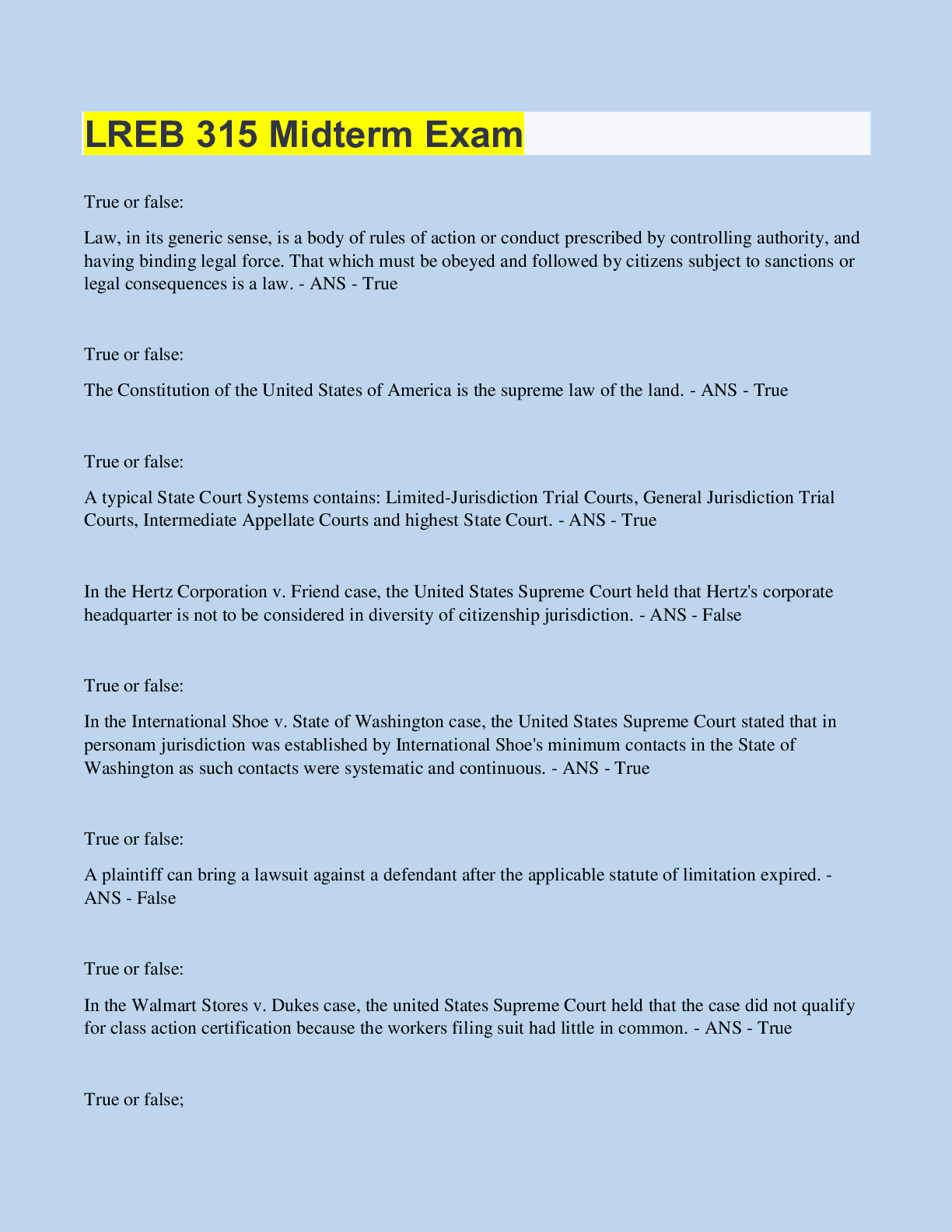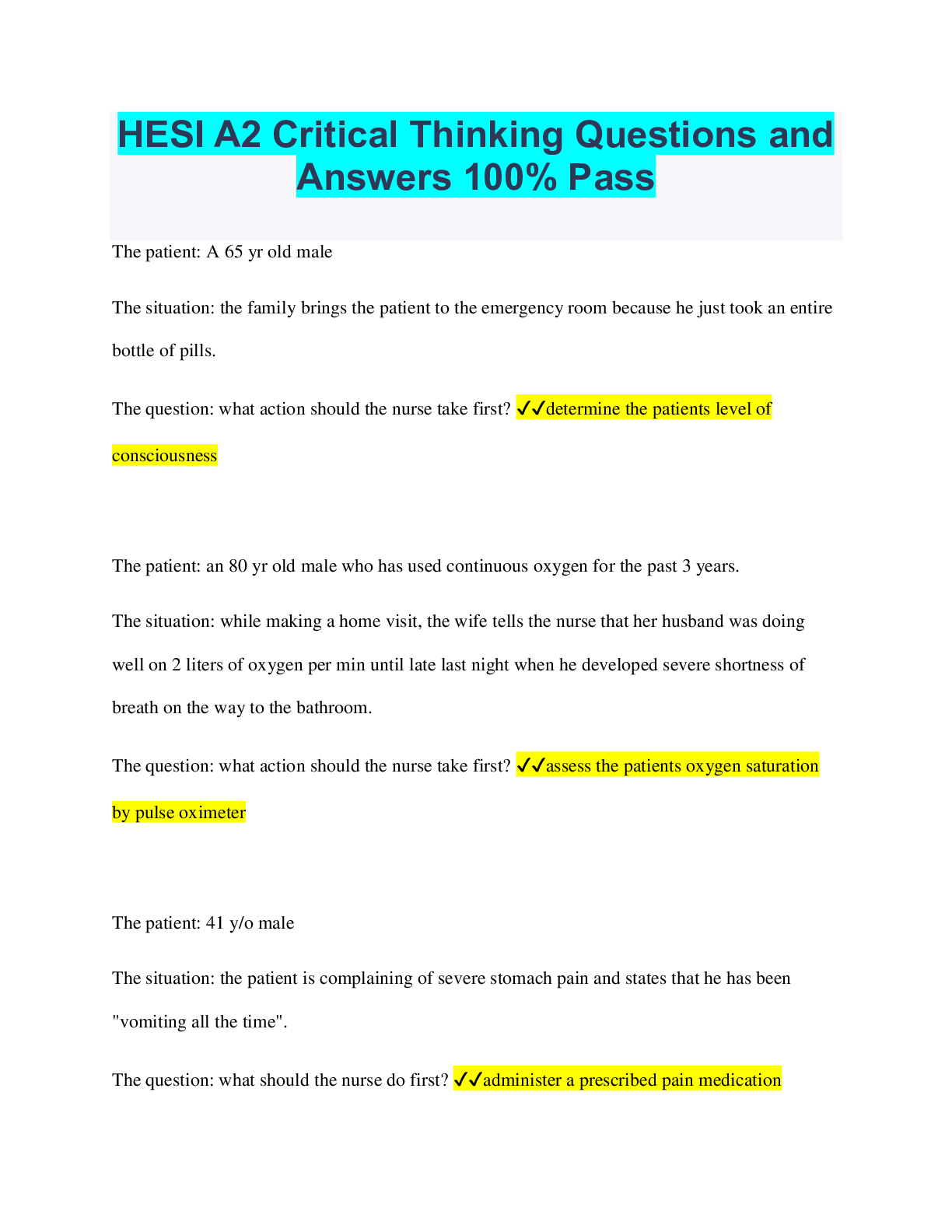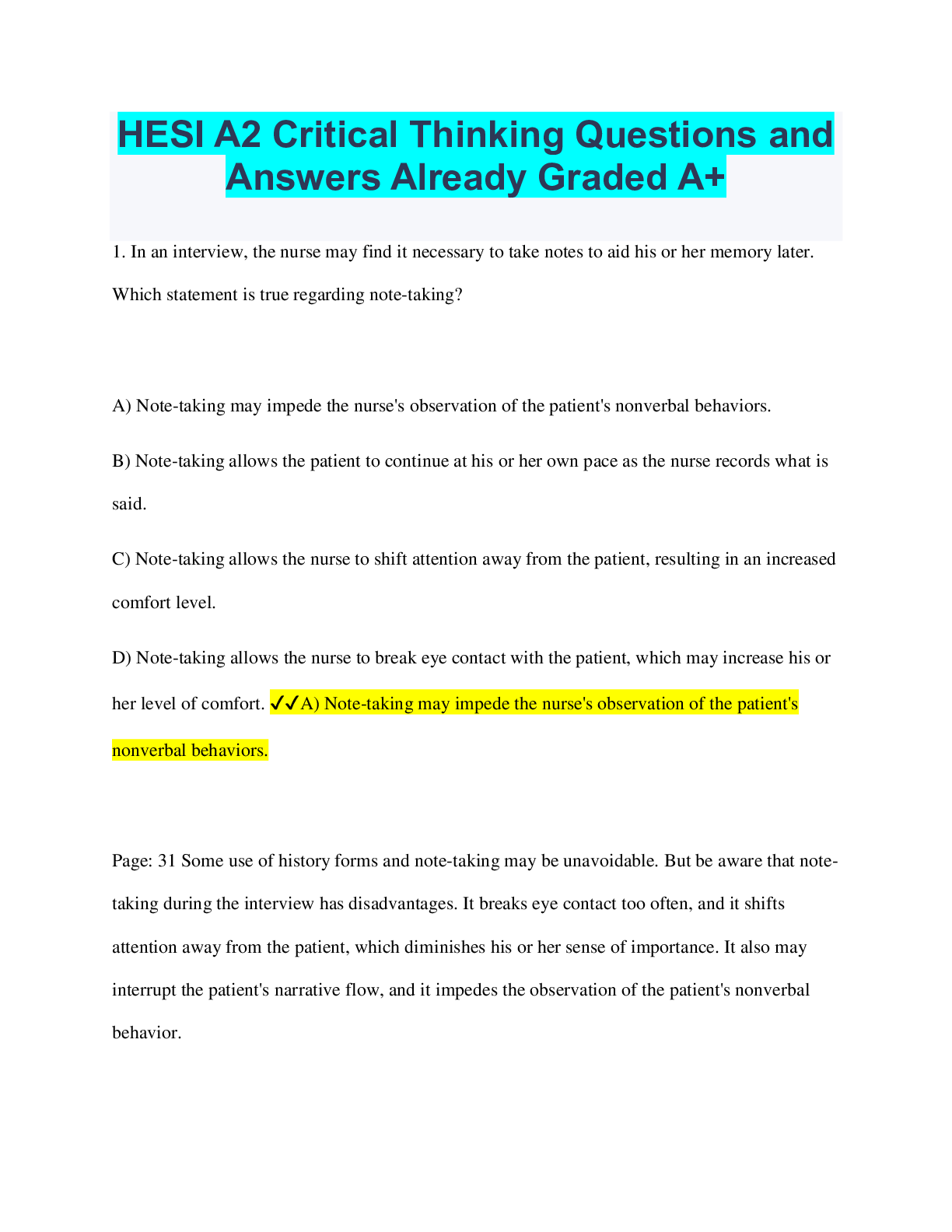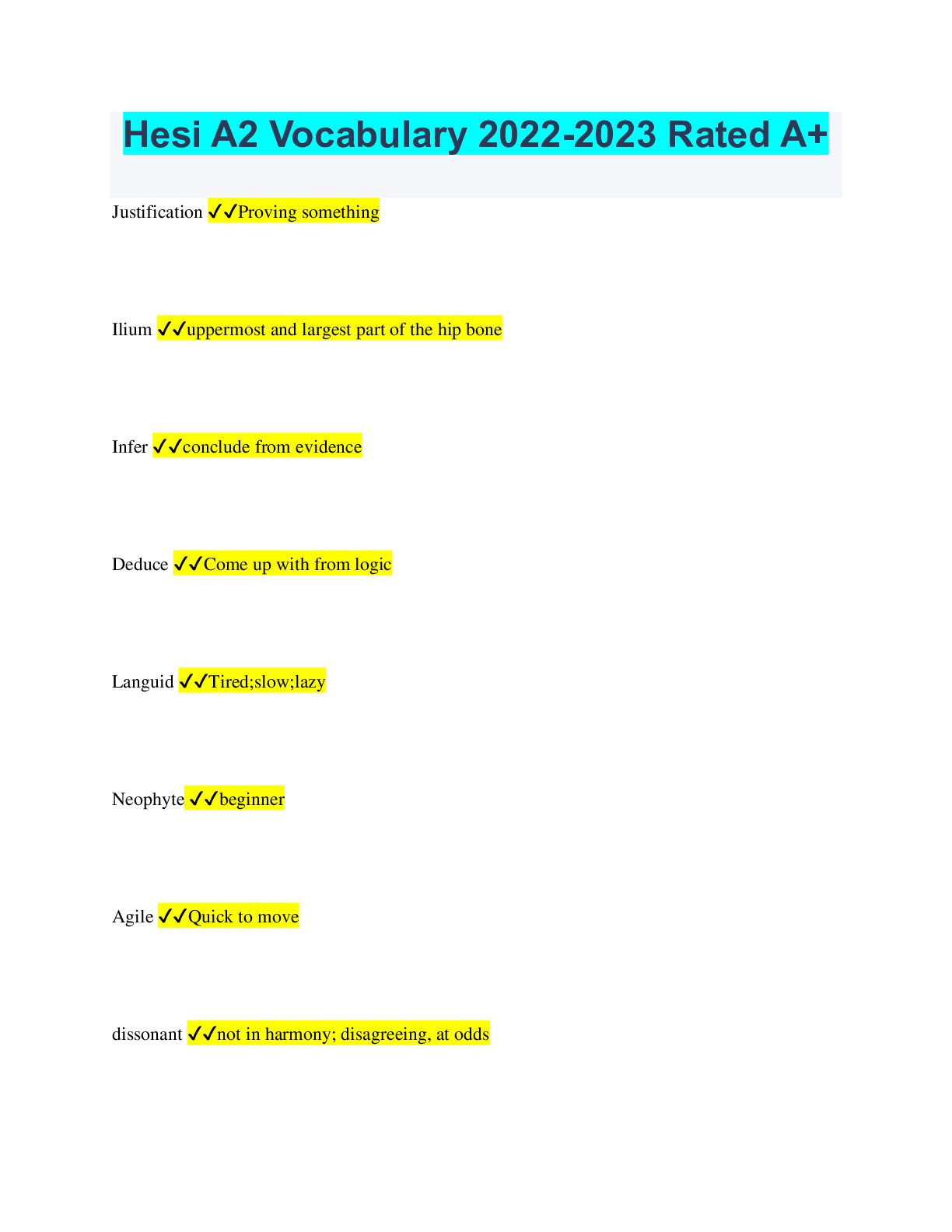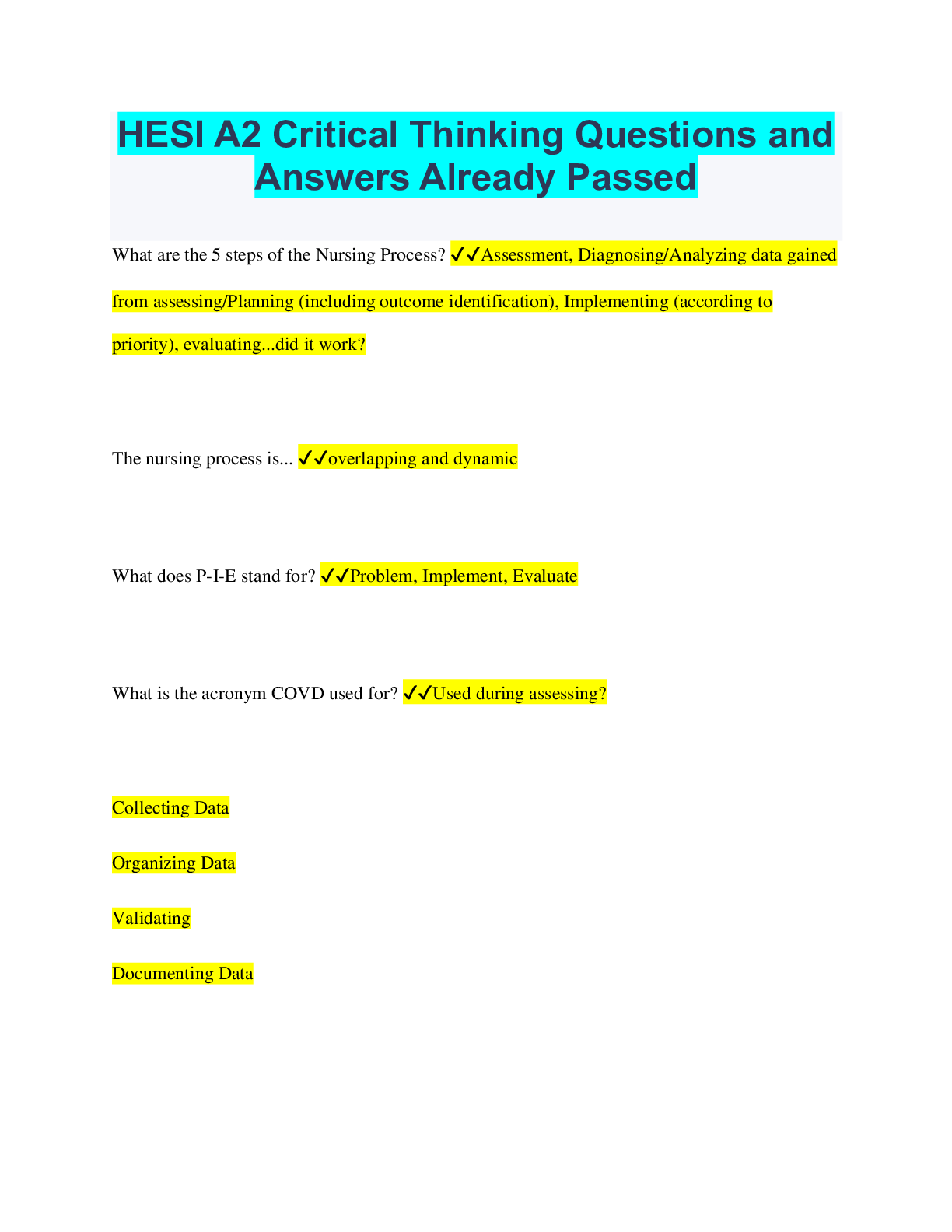Medical Studies > QUESTIONS & ANSWERS > EXAM QUESTIONS & ANSWERS LEGAL MEDICINE & MEDICAL ETHICS 100% A+ Guide (All)
EXAM QUESTIONS & ANSWERS LEGAL MEDICINE & MEDICAL ETHICS 100% A+ Guide
Document Content and Description Below
An elderly woman told her daughters that if she ever ended up with dementia she wouldn't want to live like that. Years later she developed senile dementia and her daughters had her move into a nurs... ing home. Although she did not recognize family or friends, she enjoyed the company of others and the nursing home's cat. When she stopped eating, her daughters were asked whether she should receive a feeding tube.1 a. The daughters may approve the insertion of a feeding tube with the proviso that future triggers could lead to its removal or nonuse. b. The daughters should consider their mother’s previously stated wishes as an advance directive and must not place a feeding tube. c. The daughters cannot decide for their mother because of lack of both a power of attorney for health care and an advance directive. d. Before placing a feeding tube, the daughters should obtain a court order. 1 Answer: a The daughters should consider her previously stated wishes as well as her current best interests. The daughters don't know how to proceed because they did not have the advance care planning conversation that clarified what their mother meant when she said that she wouldn't want to live with dementia. Was it the cognitive problems, the problems with self care, living in an institution, or the sense that living with dementia would not bring any joy? Without knowing this, the daughters are unprepared to step into her mothers shoes. Without really knowing their mother's wishes, the decision about a feeding tube is difficult. The daughters may choose to approve the insertion of a feeding tube with the proviso that future triggers could lead to its removal or nonuse. For example, if her current quality of life deteriorates to the point where she is no longer experiencing joy, or if she physically tries to remove the tube and keeping the tube in means restraining her, it may be appropriate to remove the feeding tube at that time. http://depts.washington.edu/bioethx/topics/adcared1.html 3 2009 Exam Questions & Answers LEGAL MEDICINE & MEDICAL ETHICS Advance Care Planning 2. A patient who has coronary artery disease and congestive heart failure shows his physician his advance directive that states he wants to receive cardiopulmonary resuscitation and other forms of life-sustaining treatment has deeply held beliefs that suggest that not trying to live is tantamount to committing suicide. What should the doctor do and say to the patient in response to this?2 a. The doctor should educate the patient about the near futility of CPR under these circumstances. b. The doctor might want to ask the patient to explore this further with the chaplain. c. The patient's expression of a preference should be explored to understand its origins. d. All the above. 4 2 Answer: d The patient's expression of a preference should be explored to understand its origins. It is possible that the patient believes, based on television shows, that CPR is usually effective. If this is the case, the doctor should educate the patient about the near futility of CPR under these circumstances. However, the physician may learn that the patient has deeply held beliefs that suggest that not trying to live is tantamount to committing suicide which he perceives as morally wrong. In this situation, the doctor might want to ask the patient to explore this further with the chaplain. http://depts.washington.edu/bioethx/topics/adcared2.html 2009 Exam Questions & Answers LEGAL MEDICINE & MEDICAL ETHICS Advance Care Planning 3. A patient tells his family that he would never want to be "kept alive like a vegetable". The term "vegetable" should be understood by the doctor to mean:3 a. The patient does not want any heroics or extraordinary treatments. b. Pull the plug if the patient is ever in terminal state on a respirator. c. If the patient is in a comatose state, let him die. d. The doctor should interpret the term as vague and not helpful in advance care planning discussions unless it is clarified. 5 3 Answer: d The use of this expression is as vague as saying, "I don't want any heroics or extraordinary treatments" or, "Pull the plug if I'm ever in ...." If these types of comments in advance care planning discussions are not clarified, they are not helpful. For some patients being a "vegetable" means being in a coma, for others it means not being able to read. http://depts.washington.edu/bioethx/topics/adcared3.html 2009 Exam Questions & Answers LEGAL MEDICINE & MEDICAL ETHICS Advance Directives 4. An elderly man with end-stage emphysema presents to the emergency room awake and alert and complaining of shortness of breath. An evaluation reveals that he has pneumonia. His condition deteriorates in the emergency room and he has impending respiratory failure, though he remains awake and alert. A copy of a signed and witnessed living will is in his chart stipulates that he wants no "invasive" medical procedures that would "serve only to prolong my death." No surrogate decision maker is available. Should mechanical ventilation be instituted?4 a. The presence of a living will or other advance directive obviates the responsibility to involve a competent patient in medical decision making. b. If the patient has remained awake and alert, his living will is irrelevant to medical decision making. c. The potential risks and benefits of mechanical ventilation need not be presented to the patient because of the presence of a valid living will. d. Even if the patient refuses mechanical ventilation therapy, his wishes need not be honored because he is in the emergency room. 6 4 Answer: b If the patient has remained awake and alert, his living will is irrelevant to medical decision making. The potential risks and benefits of mechanical ventilation need to be presented to the patient. If he refuses this therapy with an understanding of the consequences, his wishes should be honored. If he opts for mechanical ventilation, it should be instituted when it becomes medically necessary. The presence of a living will or other advance directive does not obviate the responsibility to involve a competent patient in medical decision making. http://depts.washington.edu/bioethx/topics/advdird1.html 2009 Exam Questions & Answers LEGAL MEDICINE & MEDICAL ETHICS Advance Directives 5. The same patient described in Question #4 presents confused and somnolent. A copy of a signed and witnessed living will is in his chart stipulates that he wants no "invasive" medical procedures that would "serve only to prolong my death." No surrogate decision maker is available. Should mechanical ventilation be instituted?5 a. Mechanical ventilation should NOT be instituted because it serve only to "prolong death" in this patient. b. Mechanical ventilation should be instituted because of the intent of the directive in the living will is evident. c. Mechanical ventilation should be instituted because the patient’s pneumonia represents a potentially reversible condition from which the patient may recover fully. d. The living will is NOT a helpful guide to mechanical ventilation decision-making in this patient. 7 5 Answer: c If the man has deteriorated to the point that he can no longer communicate, his living will may be a helpful guide to decisionmaking. The language of the directive, however, is difficult to interpret in this case. Pneumonia represents a potentially reversible condition from which the patient may recover fully. Mechanical ventilation does not serve only to "prolong death" but offers a significant chance to return to his previous level of functioning. Most patients with even end-stage emphysema can be successfully weaned from mechanical ventilation. The intent of the directive, whether to avoid intubation and ventilation at all costs or simply to withhold such therapies when they are clearly futile, is not evident. In the absence of other information to aid the decision, mechanical ventilation should be instituted, with the plan that it be discontinued if it becomes evident that the patient cannot be weaned. http://depts.washington.edu/bioethx/topics/advdird2.html 2009 Exam Questions & Answers LEGAL MEDICINE & MEDICAL ETHICS Breaking Bad News 6. Jose is a 62-year-old man who just had a needle biopsy of the pancreas showing adenocarcinoma. You run into his brother in the hall, and he begs you not to tell Jose because the knowledge would kill him even faster. A family conference to discuss the prognosis is already scheduled for later that afternoon. What is the best way for the doctor to handle the situation?6 a. The doctor should honor the request of the family member who is protecting his beloved brother from the bad news. b. The doctor should tell Jose's brother that withholding information is not permitted under any circumstance. c. Jose should withhold informing the patient about the pancreatic cancer because of the grave diagnosis. d. The doctor should ask Jose how he wants to handle the information in front of the rest of the family, and allow for some family discussion time for this matter. 6 Answer: d It is common for family members to want to protect their loved ones from bad news, but this is not always what the patient himself would want. It would be reasonable to tell Jose's brother that withholding information can be very bad because it creates a climate of dishonesty betwee [Show More]
Last updated: 2 years ago
Preview 1 out of 67 pages

Buy this document to get the full access instantly
Instant Download Access after purchase
Buy NowInstant download
We Accept:

Reviews( 0 )
$12.00
Can't find what you want? Try our AI powered Search
Document information
Connected school, study & course
About the document
Uploaded On
Jun 30, 2021
Number of pages
67
Written in
Additional information
This document has been written for:
Uploaded
Jun 30, 2021
Downloads
0
Views
171



